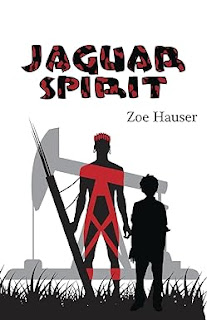https://www.amazon.com/dp/1088217257/
What inspired you to write
"Jaguar Spirit" and center it around the Ecuadorian jungle and its Indigenous
tribes?
I was moved by Joe Kane’s (1995)
book Savages, a firsthand account of the Huaorani tribe’s struggle to
protect their way of life in the Amazon Rainforest. So, I was inspired to write
a fictional account of the 2019 legal and political challenge the Huaorani
community waged against Big Oil. I hope Jaguar Spirit sheds some
light on the plight of Indigenous Amazonian communities, the traditional
stewards of the jungle.
The title "Jaguar Spirit" is evocative and
intriguing. How does it connect to the themes or characters in the story?
The Huaorani revere and honor the jaguar as both a protector
and guide. The Jaguar Spirit helps humans tap into unharnessed power and
protect what they love with unapologetic ferocity. I’m a big fan of world
mythology and enjoyed weaving the jaguar’s symbolism into the narrative.
Liam Hayes is a complex character who undergoes a
significant transformation. How did you approach crafting his journey from a
privileged background to being confronted by stark realities?
Liam is a teenager from D.C., so his reactions, questions, and actions required authenticity. He’s grown up with video games and pizza, so eating his first grub isn’t easy. And he’s a vegetarian, so hunting monkeys isn’t his thing, either. Most importantly, he’s grown up in a world that’s benefited from the oil industry, and his dad’s an oil executive. So, throughout the novel, Liam wrangles with his relationship to the oil question.
How did you approach the portrayal of the Indigenous
tribe in the novel to ensure it was respectful and avoided stereotypes?
Jaguar Spirit took five years to write and involved a
tremendous amount of research. In addition to learning quite a bit from Joe
Kane’s work, I spent hours reading articles and reviewing film footage. In
addition, I’ve traveled to the jungles of South America and witnessed the toll
industry can have on the environment and its people. One of the novel’s themes
is self-determination, so crafting an accurate and respectful narrative was
essential.
The book delves into the conflict between business
interests, like the oil industry, and Indigenous rights. How did you research
and handle this sensitive topic with authenticity?
I wanted to expose
the harsh reality of oil extraction in a way that poses questions and allows
readers to come to their own conclusions. For that reason, the events and testimonials
in the novel needed to be rooted in fact. Technically, this novel is
contemporary historical fiction.
Throughout the story, Liam grapples with his beliefs and
the consequences of standing up for them. Why was it important for you to highlight
this internal struggle in your narrative?
I’ve long supported the struggles of oppressed people to
organize in their own interest, so this was personal for me. But as we all
know, standing up for what you think is right can be challenging because society
often encourages us to focus on ourselves. Liam never wanted to be like his oil
exec father and anthropologist-turned-missionary mother; he vowed to follow a
more “normal” path. But after
inadvertently landing in the jungle, he finds himself tussling with some of the
same issues his parents grappled with. His internal struggle stems from his
journey and realization that he has the power to make effective change.
The setting of the Amazon rainforest is almost a
character in itself. How did you go about capturing its beauty, mystery, and
challenges in your writing?
I’ve been fortunate to travel to Central and South America,
so I’ve experienced their jungles. I’ve thrashed through rain forests, woken up
to the roar of Howler monkeys, and have done my best to avoid stepping on
venomous snakes!
Without giving away any spoilers, can you talk about the
significance of the "girl of his dreams" in Liam's life and journey?
Liam is a typical teenager; his relationships with three
women (I know, lucky guy, right?) correlate with the various stages of his
character arc. When we meet him, he’s somewhat aimless and insecure; he
grapples with his relationship to the oil question and ultimately finds his
voice. But in the process, his relationships are jeopardized because of his
choices.
Did your perspective or understanding of environmental
and Indigenous issues change in the process of writing this book?
Yes, I learned a lot about the complexities of the
international oil business and its impact on the Amazon. Researching and
writing Jaguar Spirit reinforced my belief in the power of community; the
campaign waged by the Huaorani is a reminder of that power. Sometimes, it’s
easy to be fatalistic and think the world is doomed, but there’s hope.
What do you hope readers will take away from "Jaguar
Spirit" after turning the last page?
I hope readers will root for Liam as he gets himself into
and out of scrapes. But my ultimate goal is for readers to cherish the time
spent with the Huaorani and walk away with a deeper understanding of the
interconnectedness of the environmental struggle and the plight of Indigenous
communities.

